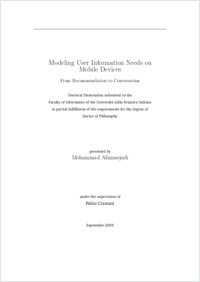Modeling user information needs on mobile devices : from recommendation to conversation
- Aliannejadi, Mohammad
- Crestani, Fabio (Degree supervisor)
-
13.09.2019
222 p
Thèse de doctorat: Università della Svizzera italiana, 2019
Mobile information retrieval
Context-aware recommendation
Personalization
Point-of-interest recommendation
Metasearch
Unified mobile search
Field study
Query log
Search data analysis
Conversational search
Open-domain conversations
Information-seeking conversations
Clarifying questions
English
Recent advances in the development of mobile devices, equipped with multiple sensors, together with the availability of millions of applications have made these devices more pervasive in our lives than ever. The availability of the diverse set of sensors, as well as high computational power, enable information retrieval (IR) systems to sense a user’s context and personalize their results accordingly. Relevant studies show that people use their mobile devices to access information in a wide range of topics in various contextual situations, highlighting the fact that modeling user information need on mobile devices involves studying several means of information access. In this thesis, we study three major aspects of information access on mobile devices. First, we focus on proactive approaches to modeling users for venue suggestion. We investigate three methods of user modeling, namely, content-based, collaborative, and hybrid, focusing on personalization and context-awareness. We propose a two-phase collaborative ranking algorithm for leveraging users’ implicit feedback while incorporating temporal and geographical information into the model. We then extend our collaborative model to include multiple cross-venue similarity scores and combine it with our content-based approach to produce a hybrid recommendation. Second, we introduce and investigate a new task on mobile search, that is, unified mobile search. We take the first step in defining, studying, and modeling this task by collecting two datasets and conducting experiments on one of the main components of unified mobile search frameworks, that is target apps selection. To this end, we propose two neural approaches. Finally, we address the conversational aspect of mobile search where we propose an offline evaluation protocol and build a dataset for asking clarifying questions for conversational search. Also, we propose a retrieval framework consisting of three main components: question retrieval, question selection, and document retrieval. The experiments and analyses indicate that asking clarifying questions should be an essential part of a conversational system, resulting in high performance gain.
- Language
-
- English
- Classification
- Computer science and technology
- License
-
License undefined
- Identifiers
-
- RERO DOC 327353
- URN urn:nbn:ch:rero-006-118763
- ARK ark:/12658/srd1319099
- Persistent URL
- https://n2t.net/ark:/12658/srd1319099
Statistics
Document views: 304
File downloads:
- Texte intégral: 296
